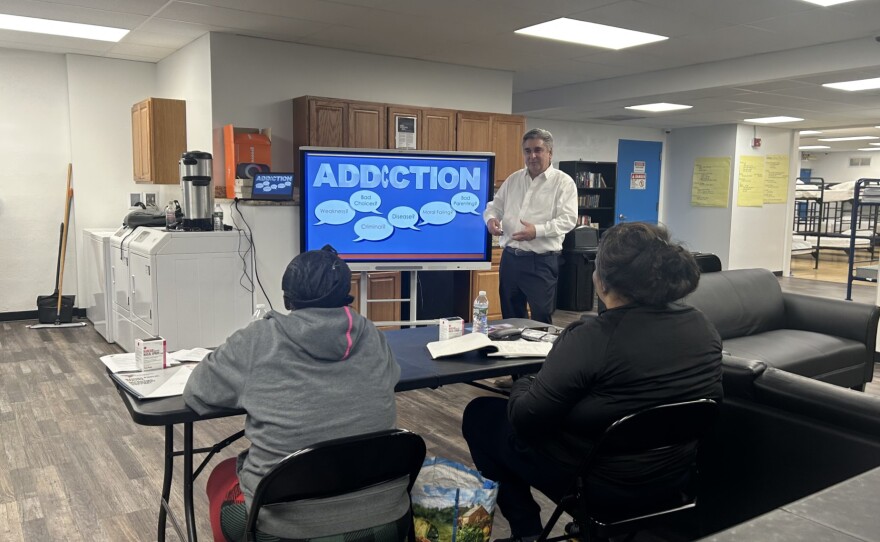- As Allentown’s warming station is set to open, a training program provides resources for how to engage those with active addiction
- The St. Joe's program typically trains first responders, but is branching out to community groups
- Allentown's only emergency shelter opens Nov. 15
ALLENTOWN, Pa. — Allentown’s only warming station is set to open next week and staff are going through training about how to help people who need to get out of the elements and into a bed for the night.
Part of that training includes a program about how to engage someone in active addiction.
People facing active addiction often face stigma — not only from their family, friends and the public, but from themselves.
"That stigma that 'I'm worthless” keeps people from saying, 'I want help.'Steve Forzato, executive director at St. Joseph's University Center for Addiction and Recovery Education
"That stigma that, 'I'm worthless.' keeps people from saying, 'I want help.' Right?" said Steve Forzato, who spent 33 years in law enforcement as an undercover officer and was deputy chief of agents under state Attorney General Josh Shapiro.
"It's that sense of failure, the lack of confidence that, ‘I could stop using.’”
Forzato, the executive director of the Center for Addiction and Recovery Education at Saint Joseph’s University, now spends his life teaching first responders how to do their jobs with more compassion.
"We teach people how to motivationally engage people that are struggling, that are living with active addiction,” he said.
'How can we help?'
Forzato recently spent the evening at the Greater Valley YMCA Allentown branch, educating the staff on St. Joe’s Phoenix Training.
It’s a grant-funded program created to teach first responders how to interact with people dealing with substance abuse and other addictions. It’s now expanding to community groups.
"Their hand is out, saying, 'How can we help the people of Allentown that may be struggling with substance use disorder?'"Steve Forzato, executive director at St. Joseph's University Center for Addiction and Recovery Education
Forzato now is working to expand and offer the program to community groups, such as the YMCA, at no cost.
"This incredible program is run by the Executive Director Jodi and they are a group of people who are engaging the public, much like the police, but without that power without that badge," he said.
"Their hand is out, saying, 'How can we help the people of Allentown that may be struggling with substance use disorder?'"
Jodi Perry, executive director of the Greater Valley YMCA Allentown branch, said, “we're getting ready to open our center on Nov. 15, where we will house up to 15 unhoused individuals, provide meals, shelter, warm showers and a place for them to get away from the elements."
This is the sixth year for Allentown’s only emergency shelter.
It opens at 7 p.m. and closes at 7 a.m. every day.
Then the unhoused individuals can go to one of several day-centers in the area.
'These are real people'
Perry said, “We have really three very distinct populations that come into our warming station." Perry said.
"About a third of our population is actually fully employed and they have full time jobs, they have a car, but unfortunately cannot afford housing in the Allentown area," she said.
“Another third are what we call transitional, that either had life experiences that have made them temporarily homeless, perhaps a loss of a job, a car accident, loss of insurance, loss of a loved one that bring them to us.
"The other third is those individuals that may be here because of drug or alcohol addictions or mental health issues.”Jodi Perry, executive director of the Greater Valley YMCA Allentown branch
"And then the other third is those individuals that may be here because of drug or alcohol addictions or mental health issues.”
The Phoenix program is being used by the YMCA staff to address people coming into the shelter from different backgrounds.
"This is not a movie script where we go and we say, ‘Hey, look at that drug addict, look at that alcoholic,’" Perry said.
"These are real people and we have the privilege of dealing with them every single day. There are many times that our folks come in either drunk or high and just being able to understand and meet them where they're at and kind of maybe let them deescalate themselves or sleep it off and find resources to get them there.”
Training law enforcement, too
The people who will work at the warming station will undergo 45 hours of training, including the Phoenix Training, Narcan training to save those who have overdosed, treatment and drug addiction, human trafficking, CPR and First Aid basics, as well as standard operating procedures.
The shelter is for men and women 18 and older and runs through April.
To date, about 7,000 first responders have taken the class — something Forzato is proud to share.
"It's also important to make sure that law enforcement officers, when they encounter nonviolent offenders, people that are just there to buy instead of sell, that they are equipped with the education to know how to connect those people to treatment."Steve Forzato, executive director at St. Joseph's University Center for Addiction and Recovery Education
"It's so, so important to have law enforcement involved," he said.
"But it's also important to make sure that law enforcement officers, when they encounter nonviolent offenders, people that are just there to buy instead of sell, that they are equipped with the education to know how to connect those people to treatment."
The St. Joe’s team has been educating first responders on the topic for four years. It has completed about 350 training events in 42 states, Canada, Trinidad and Tobago.




